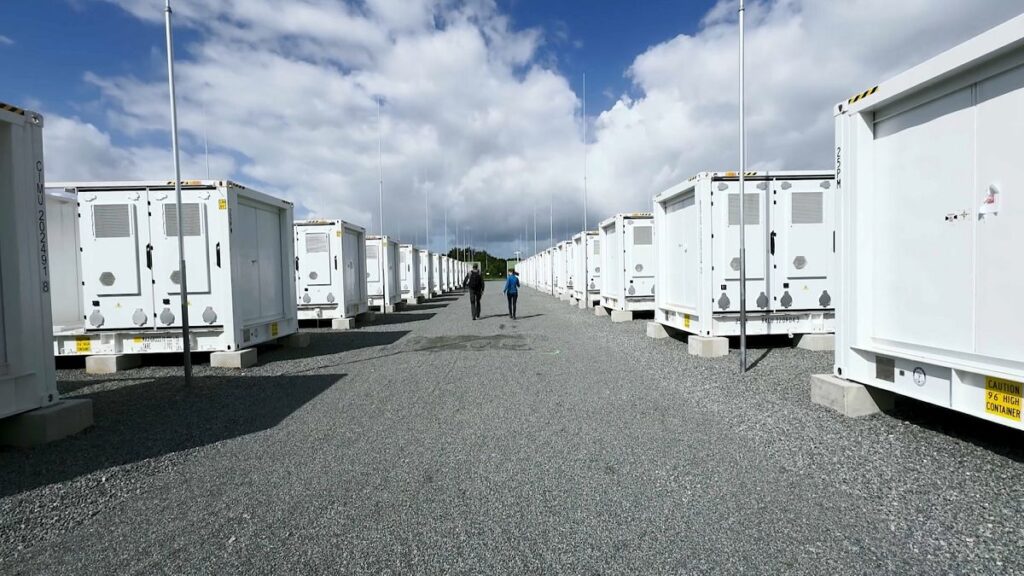Bollingstedt, a town in northern Germany: The largest battery storage facility in Germany is located here. Project manager Carina von Schleinitz shows me the secrets of the plant. 64 mega-containers, packed with battery technology, guarantee high voltage on demand. Slow coal-fired power stations could soon become obsolete as an energy reserve.
“We are doing pioneering work,” smiles the project manager proudly. “Until now, many still lived in a very conventional world in which a quarter of an hour played a significant role (in stabilising the electricity grid). But, we need to react within seconds, because volatile renewables, as the name suggests, generate volatility.”
This is precisely why the electricity grids are now being digitalised. However, some network operators are putting on the brakes. There are also conflicts regarding network access. There is a lack of capacity. This is where politicians are called on to adapt the framework conditions.
When there is a lot of sun and wind, a lot of renewable energy flows into the electricity grids. To keep the voltage stable, photovoltaic and wind power plants are frequently curtailed. This means that valuable energy remains unutilised. The curtailment brings billions in losses!
Conversely, there is also a problem when it is dark and there is no wind: Then there is a lack of energy. To stabilise the grid, fossil fuel power plants are often ramped up during periods of low wind. But gas and coal threaten the global climate.
To avoid this, grid and storage capacities are to be expanded in the EU. Pumped storage power plants convert excess wind or solar power into hydropower, and Greece is currently building large plants. More and more battery storage systems are also being installed, for example in Germany, as the costs of battery cells decrease.
Electricity consumption in the EU could increase by 60 per cent by the end of the decade. Almost 500 billion euros must be invested in the transmission grids and over 700 billion in the distribution grids by 2040!
The northern part of Germany, for example, produces a lot of wind power. But the biggest consumers are in the south. That’s why Germany needs “electricity motorways” and many intermediate storage facilities.
Georg Gallmetzer, Managing Director of ECO STOR: “We are in the midst of one of the biggest transformations that modern industrialised societies have ever seen. We have authorisation hurdles that need to be removed. This is where a dialogue at the highest level is needed!”
Interview with the Environment Minister of Schleswig-Holstein, Tobias Goldschmidt, member of the Green Party. The northern German state is regarded as a pioneer of the energy transition.
Euronews: “Why is the expansion of electricity grids and storage important for the energy transition?”
Goldschmidt: “Large amounts of energy come from offshore wind turbines. The electricity has to be transported further and this requires new grids. We are building new power lines at a fast pace in Schleswig-Holstein. And now we are also seeing a massive increase in battery storage systems so that the grids can be better utilised.”
Euronews: “Gas-fired power plants are being built all over Europe . Is this the end of the energy transition?”
Goldschmidt: “No! We are in the middle of the energy transition, especially here in the north (of Germany). We are building wind turbines, photovoltaic systems and battery storage systems at record speed. Putting everything back on natural gas is the wrong approach. Every investment in a gas-fired power plant makes electricity and energy more expensive. By investing in renewable energies, we are investing in a favourable energy supply in Europe.”
Euronews: “The President of the European Commission has assured the US President to import large quantities of liquefied natural gas: Do you take a critical view of that or is it a good thing?”
Goldschmidt: “This is not a good thing at all, people in Europe don’t want fracked gas! Plus, that’s an expensive cup of tea! And in the end, it’s not market-based.”
Read the full article here

